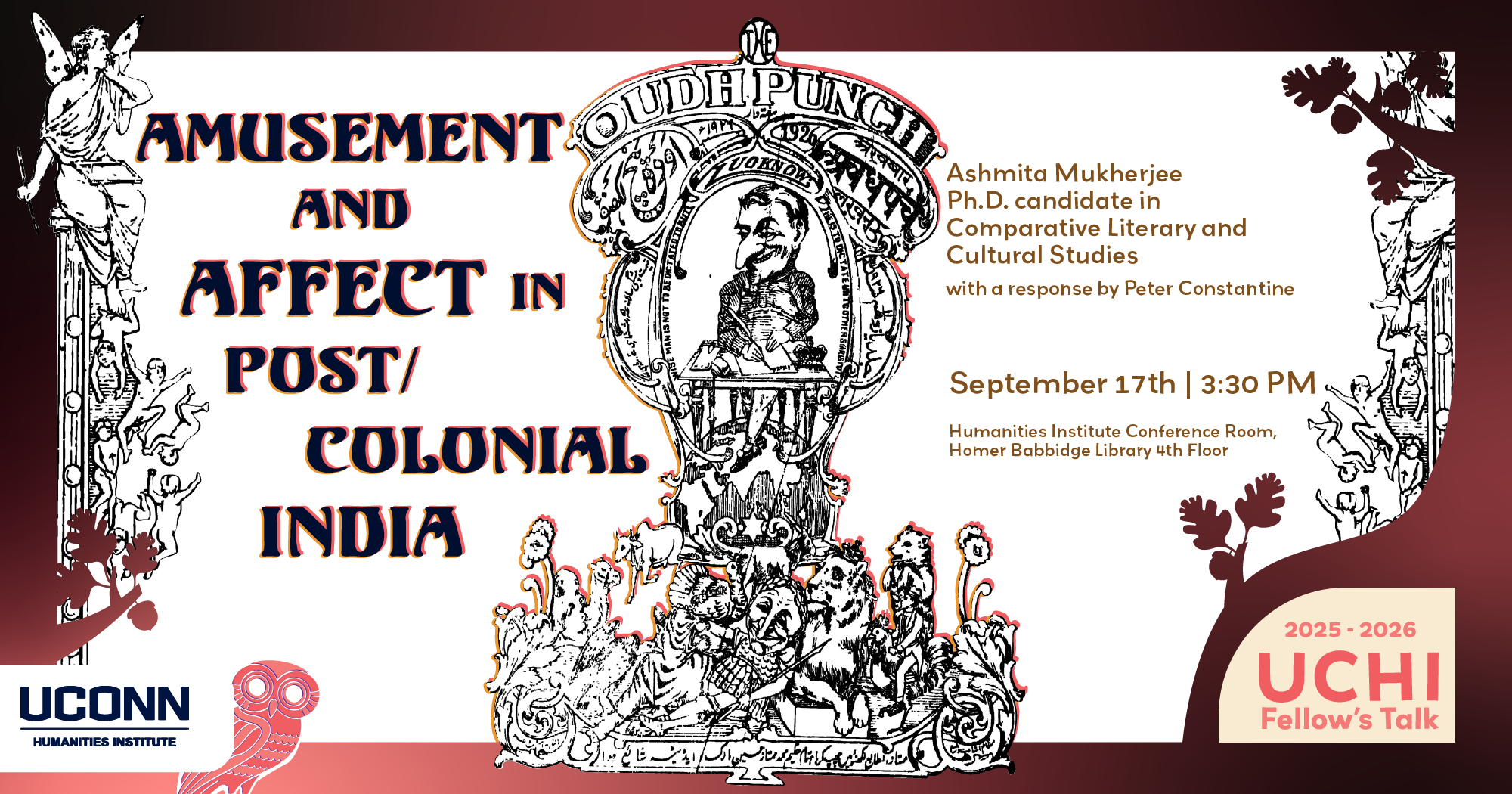
Amusement and Affect in Post/Colonial India
Ashmita Mukherjee (Ph.D. Candidate, Literatures, Cultures, and Languages, UConn)
with a response by Peter Constantine (Literatures, Cultures, and Languages, UConn)
Wednesday September 17, 2025, 3:30pm, Humanities Institute Conference Room (HBL 4-209)
The event will also be livestreamed with automated captioning.
Can resistance be fun? Doctoral researcher Ashmita Mukherjee argues for a new approach to understanding anti-colonial resistance in South Asia in the late nineteenth and early twentieth century. Rather than focusing solely on traditional political and military histories, she examines the power of literary amusement and its emotive impact. She defines amusement as a transient, light, bright, and sparkling emotion that, despite its fleeting nature, has proven to be an enduring method of exposition, critique, subversion, and community building.
Her work is guided by the affective turn in literary studies, drawing on the methodologies of scholars like Rita Felski and Sara Ahmed as well as concepts from classical Indian aesthetics, particularly “rasa theory”, to uncover how shared pleasure could create a sense of collective identity. She uses examples from several genres, including editorial articles and longer works by British, Anglo-Indian, and Indian-origin writers spanning a century up to Indian independence from British rule. Editorial satire, science writing and speculative fiction, children’s literature, and amusing sketches illustrate how printed texts expressed the complex emotional landscape of a nation in the making, and became a fundamental part of shaping national consciousness.
Ashmita Mukherjee is a doctoral researcher in Comparative Literature at the University of Connecticut. Her dissertation, “Textual Pleasures: Amusement and Affect in Post/Colonial India (1850-1950),” examines the role of literary amusement as a tool for anti-colonial resistance. She is interested in global 19th-20th century, theories of emotion and affect, South Asian Studies, world literature and culture, public humanities, and digital media. She has published articles in Literature/Film Quarterly and South Asian Review, and is a creator and co-host at the YouTube channel @theantilibrarypodcast.
Peter Constantine is professor of translation studies and director of the program in literary translation in the Department of Literatures, Cultures, and Languages at the University of Connecticut. He is the publisher of World Poetry Books and the literary magazine World Poetry Review. His translations include works by Rousseau, Machiavelli, Gogol and Tolstoy for Random House, Modern Library. He co-edited A Century of Greek Poetry: 1900–2000, and the anthology The Greek Poets: Homer to the Present, which W.W. Norton published in 2010. He is a Guggenheim Fellow, a recipient of two NEAs, and was awarded the PEN Translation Prize for Six Early Stories by Thomas Mann and the National Translation Award for The Undiscovered Chekhov. His translation of the complete works of Isaac Babel received the Koret Jewish Literature Award and a National Jewish Book Award citation.
Access note
If you require accommodation to attend this event, please contact us at uchi@uconn.edu or by phone (860) 486-9057. We can request ASL interpretation, computer-assisted real time transcription, and other accommodations offered by the Center for Students with Disabilities. Requests should be made at least five business days in advance whenever possible

